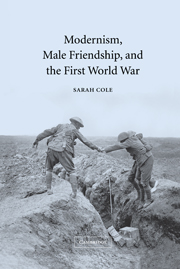Book contents
- Frontmatter
- Contents
- Acknowledgments
- Introduction
- 1 Victorian dreams, modern realities: Forster's classical imagination
- 2 Conradian alienation and imperial intimacy
- 3 “My killed friends are with me where I go”: friendship and comradeship at war
- 4 “The violence of the nightmare”: D. H. Lawrence and the aftermath of war
- Notes
- Index
3 - “My killed friends are with me where I go”: friendship and comradeship at war
Published online by Cambridge University Press: 22 September 2009
- Frontmatter
- Contents
- Acknowledgments
- Introduction
- 1 Victorian dreams, modern realities: Forster's classical imagination
- 2 Conradian alienation and imperial intimacy
- 3 “My killed friends are with me where I go”: friendship and comradeship at war
- 4 “The violence of the nightmare”: D. H. Lawrence and the aftermath of war
- Notes
- Index
Summary
In the West, the story of war is almost always a story of male bonds. Whatever war may mean for a culture, whatever terrible losses it may entail and whatever troubling instincts it may invoke, it nevertheless is fought and lived as a matter of male relationships, and these powerful ties are often highly valorized, both by the participants themselves and by the home culture that will be responsible for interpreting and assimilating the war's legacy. An emphasis on comradeship seems nearly axiomatic in the European and American imaginary about war, and has been registered in many media – painting, sculpture, fiction, poetry, film – in the context of the twentieth century's major conflicts. As Paul Baümer in All Quiet on the Western Front expresses it, “They are more to me than life, these voices, they are more than motherliness and more than fear; they are the strongest, most comforting thing there is anywhere: they are the voices of my comrades.” The huge conscripted armies of modern war seem particularly to invite an emphasis on intense masculine friendship, in part because those armies, with their enormous scale and their capacity both to inflict and to suffer extreme violence, present a challenge to the self-concept of the societies they are meant to represent and protect. The friendships associated with combat become important because they humanize and temper the terrible ferocity of war, injecting into mass warfare a hint of the culture's values: loyalty, love, community, sacrifice, valor.
- Type
- Chapter
- Information
- Modernism, Male Friendship, and the First World War , pp. 138 - 184Publisher: Cambridge University PressPrint publication year: 2003



